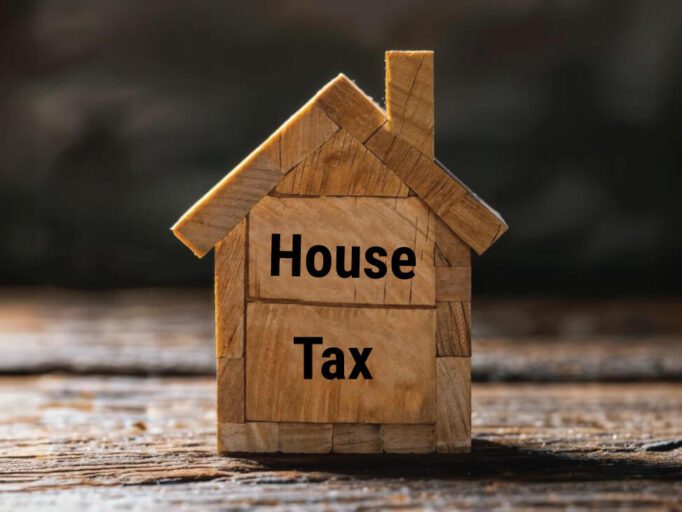House tax, also known as property tax, is a mandatory charge imposed by the local municipal authority on residential and commercial properties in Delhi. This tax is collected by the Municipal Corporation of Delhi (MCD) and contributes to maintaining public services such as roads, sanitation, water supply, and other civic amenities.
If you own a house in Delhi, understanding how much house tax you need to pay and how it is calculated is essential to ensure compliance with the law. This article explains house tax in Delhi in simple terms, including its calculation, rates, and payment process.
What is House Tax?
House tax is a percentage of the property’s annual value. The annual value is calculated based on factors such as the property’s location, type, size, and usage. Every property owner in Delhi is required to pay this tax annually to the MCD.
Delhi is divided into three municipal zones:
- North Delhi Municipal Corporation (NDMC)
- South Delhi Municipal Corporation (SDMC)
- East Delhi Municipal Corporation (EDMC)
Each zone has slightly different tax rates based on its valuation of properties.
Factors Affecting House Tax in Delhi
Several factors determine the amount of house tax you need to pay:
- Location of the Property:
- Delhi is categorized into different zones based on the property’s location, ranging from high-value to low-value zones.
- Type of Property:
- Residential properties have lower tax rates compared to commercial properties.
- Size of the Property:
- Larger properties attract higher taxes.
- Usage:
- A property used for residential purposes has a lower tax rate than one used for commercial or industrial purposes.
- Age of the Property:
- Older properties may have lower tax rates due to depreciation.
How is House Tax Calculated in Delhi?
The MCD uses the Unit Area System (UAS) to calculate house tax. Under this system, the tax is calculated based on the following formula:
House Tax = Annual Value × Tax Rate
- Annual Value (AV): AV is calculated by multiplying the unit area value (fixed by the MCD) with the property’s area and the property’s usage and structure factor.
- Tax Rate: This is a percentage fixed by the MCD and varies for residential, commercial, and industrial properties.
Categories of Property Zones in Delhi
Delhi’s properties are categorized into eight zones (A to H), with each zone having different tax rates. Below is an overview:
| Zone | Type of Area | Example Areas | Tax Rate (Residential) |
|---|---|---|---|
| A | Premium Areas | New Delhi, Chanakyapuri | 12% |
| B | Upper Middle-Class Areas | Greater Kailash, Vasant Vihar | 11% |
| C | Middle-Class Areas | Lajpat Nagar, Kalkaji | 10% |
| D | Lower Middle-Class Areas | Karol Bagh, Patel Nagar | 9% |
| E | Economically Weaker Areas | Uttam Nagar, Janakpuri | 8% |
| F | Rural/Urban Village Areas | Najafgarh, Chhatarpur | 7% |
| G | Unauthorized Colonies | Seelampur, Shahdara | 6% |
| H | JJ Clusters and Slum Areas | Various JJ Colonies | 5% |
The tax rate increases for commercial or industrial properties in the same zone.
How to Pay House Tax in Delhi?
Paying house tax in Delhi is straightforward. You can pay it both online and offline.
1. Online Payment:
- Visit the official MCD website: MCD Property Tax Portal
- Select your zone (North, South, or East).
- Enter your property ID.
- Verify property details.
- Calculate the tax payable.
- Make the payment using net banking, debit card, or credit card.
2. Offline Payment:
- Visit the nearest MCD office.
- Fill out the property tax form.
- Submit the form along with the payment (cash, cheque, or demand draft).
After payment, keep the receipt as proof of tax submission.
Penalties for Non-Payment
Failing to pay house tax on time can result in penalties, including:
- Interest: Late payments attract an interest of 1% per month.
- Legal Action: Continued non-payment can lead to legal notices and property seizure in extreme cases.
To avoid penalties, ensure you pay your house tax before the due date.
Exemptions on House Tax
Certain properties in Delhi are exempt from house tax:
- Religious and Charitable Institutions: Properties used for religious or charitable purposes are exempt.
- Agricultural Land: Properties classified as agricultural land do not attract house tax.
- Senior Citizens and Women: Discounts may apply for senior citizens and women property owners.
- Disabled Individuals: Properties owned by disabled individuals may also get exemptions.
FAQs
1. What is the deadline to pay house tax in Delhi?
The deadline is usually March 31st of every financial year. Check the MCD website for updates.
2. Can I get a rebate on house tax?
Yes, the MCD offers a rebate of up to 15% if you pay the tax early, typically before June 30th.
3. How do I find my property’s zone?
You can find your property’s zone by entering the property details on the MCD website or contacting the MCD office.
4. What happens if I overpay house tax?
If you overpay, the excess amount will be adjusted against your future tax payments.
5. Do tenants need to pay house tax?
No, house tax is the responsibility of the property owner, not the tenant.
By understanding the basics of house tax in Delhi, you can calculate, pay, and manage your property tax effectively, ensuring compliance with local regulations while avoiding penalties.
Chirag Singh is a content writer with a focus on real estate, covering topics like News, Guidance, Tips, Property trends and Investments. He has written for various platforms, providing helpful insights to readers. With a background in real estate, Chirag combines his knowledge and passion for real estate in his work. He enjoys staying updated on the latest industry trends.

